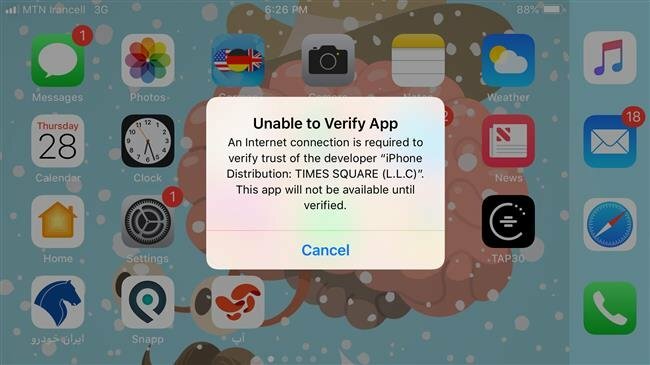Apple's enterprise program block is not limited to Iran: official

TEHRAN – Apple Inc. has blocked enterprise programs due to its rule for app distribution policy, which is worldwide and is not limited to Iran, head of the Information Technology Organization of Iran, Amir Nazemi, told Mehr on Thursday.
Iranian users of iOS systems do not have access to some of their applications which they have installed from other sources than App Store since Wednesday, which includes Iranian online banks services, online payments as well as ride-hailing and food delivery services.
The Apple users have access to apps through App Store, which is not applicable for Iranian developer during past years due to U.S. sanctions, he explained.
Another method, which is used frequently in Iran, was an enterprise program, the app developers provide the iOS version on their website for Apple users, he said.
Apple blocks the enterprise programs due to copyright infringe and violating privacy policy.
The app develops in Iran are seeking for another method to provide Apple users with Iranian applications, he said.
However, it is believed that the Apple enterprise program block in Iran is the result of the essay by Nariman Gharib the presenter at the UK-based Manoto TV channel, which is officially viewed as an enemy of the Islamic Revolution.
In his essay, which appeared on February 1, 2019 on medium.com, he provides a list of Iranian banks, which use the iOS developer enterprise certificate program in Iran.
Apple does not have an App Store in Iran, but Iranian developers have created several apps for sale in other domestically developed App Stores, and iPhones are routinely smuggled into the country, despite an official ban on their sale.
However, Information and Telecommunication Minister Mohammad Javad Azari Jahromi announced in August 2017 that Apple holds 11 percent share of the Iranian cellphone market.
Apple removed Snapp, a ride-hailing app similar to Uber that is popular in Iran, from its app stores in August 2017. That followed the removal of apps for food delivery, shopping and other services.
In a message to Iranian developers whose apps were affected by the ban, Apple said, “Under the U.S. sanctions regulations, the App Store cannot host, distribute or do business with apps or developers connected to certain U.S. embargoed countries.”
The takedown appears to be an expansion of efforts to restrict Iranian titles that offer in-app transactions, AppleInsider, the news website for Apple products published.
According to the AppleInsider, the company has in the past banned certain apps created by Iranian developers in reaction to U.S. sanctions against that country; this most recently happened in August 2017. Those sanctions forbid Apple from selling hardware or distributing software in Iran.
Apple bans Google internal iOS apps
According to The Verge, Apple shut down Google’s ability to distribute its internal iOS apps on January 31, 2019. A person familiar with the situation told The Verge that early versions of Google Maps, Hangouts, Gmail, and other pre-release beta apps stopped working alongside employee-only apps like a Gbus app for transportation and Google’s internal cafe app.
The block came after Google was found to be in violation of Apple’s app distribution policy, and followed a similar shutdown that was issued to Facebook in late January.
Apple is clearly sticking to its rules and applying them equally to Facebook, Google, and likely many other companies that get caught breaking Apple’s rules in the future.
There’s growing evidence that a number of companies are using Apple’s enterprise program to distribute apps to consumers. iOS developer Alex Fajkowski has discovered that Amazon, DoorDash, and Sonos all distribute beta versions of their apps to non-employees. Apple may be forced to take action against these apps or to even revamp its entire enterprise program in the future.
SB/MG
Leave a Comment